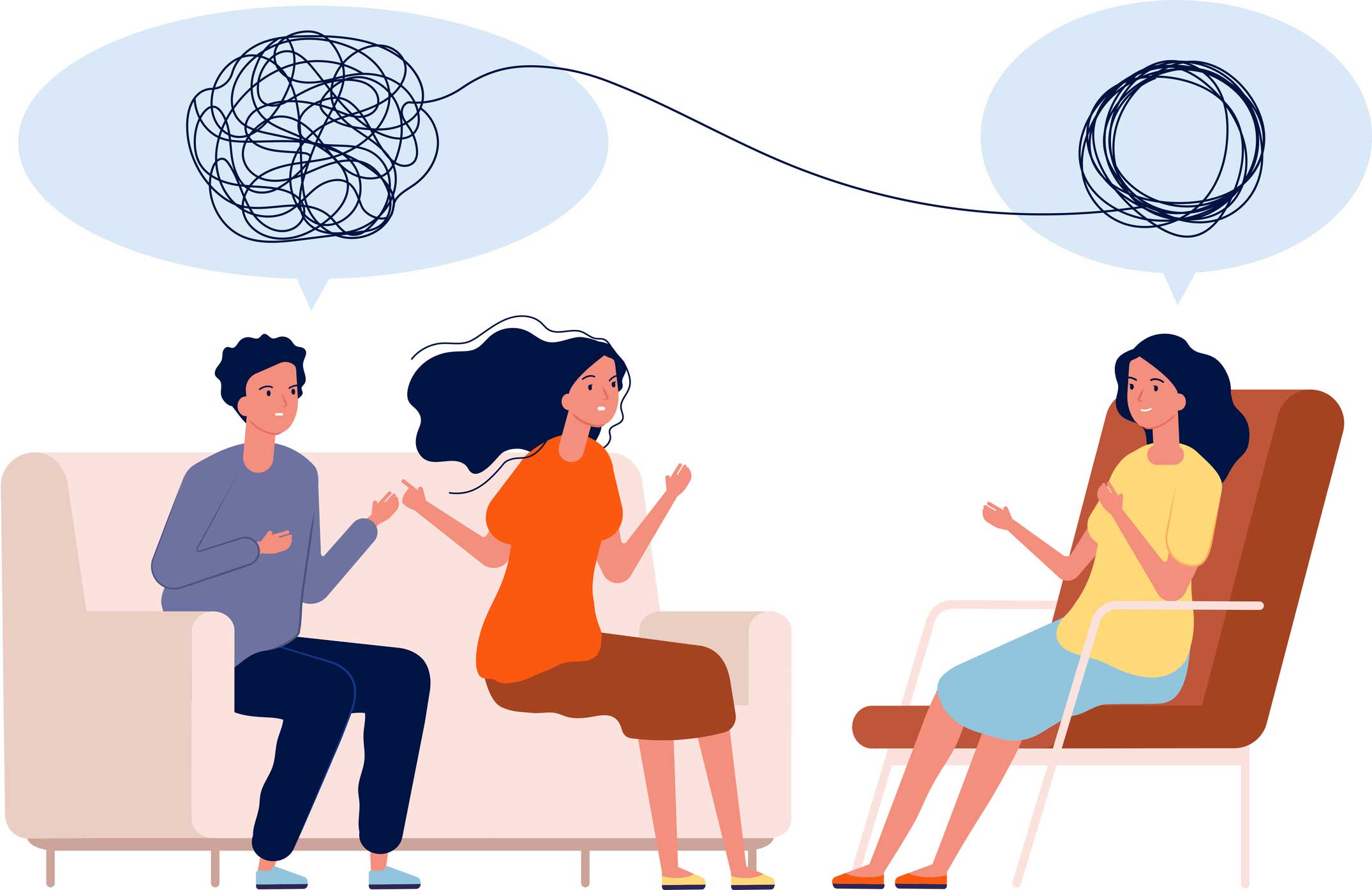I’ve specialized in working with couples for 40 years. A “back-of-the-envelope” calculation tells me that’s about 33,000 hours of couples work.
You can bet I’ve learned a lot of lessons – both painful and productive ones.
Here’s one I'm still refining, and it might make a difference for you.
I have found that defining my role allows me to be more successful with tough couples by integrating the roles of guide/leader.
It’s crucial to figure out my role for any individual couple in front of me. And it's a huge challenge – because it's different for each one.
Defining a clear role for yourself with every couple you see can’t exactly be taught because it's so complex and individualized. But I have some ideas that might be helpful.
If you had anything like my Rogerian training, you might be inclined to emphasize unconditional acceptance and positive regard. We strive not to direct, judge, or impose our values on our clients.
You’ll notice this approach has some severe limits with highly distressed, highly defended couples.
A non-directive approach is like getting in the car with two very disagreeable people and no agreement on where we are headed! We’ll end up arguing about everything: the destination, the route, the supplies, the schedule, and more.
This frustrating process happened to me with clients over and again. You can imagine how often, as I was seeing about 20-25 couples a week.
If I was going to survive, I had to change my role. Significantly.
You, too, might have noticed that no matter how many different theories you have under your belt, you can’t accomplish much without your strong leadership.
When a highly distressed couple seeks help, they are not in pursuit of individual growth. Partners seek relief, hoping the other person will change and become more responsive.
My agenda was always to have each partner become more responsive to the other.
But that was not what the partners desired!
Highly defended couples hire us to solve that problem – hoping their partner will change. But they certainly don’t intend to invest much effort or emotional risk on their part.
When we don’t solve that problem to their satisfaction, we limp along in sessions. Or they quit therapy.
A part of me then felt fraudulent. Charging money without delivering a better relationship.
Getting out of this dilemma is a multi-step approach. No simple or single intervention or concept breaks their log jam.
But I can offer some key points to jump-start your thinking.
With highly distressed, highly defended couples, it is important to become a compassionate, supportive guide/leader as quickly as possible.
This means co-creating a plan about where your couple wishes their relationship to go. This is their North Star. There is mutual agreement about the direction we are headed. That includes agreement about the role all three of us will play.
Believe me. You do not get that agreement by asking about their goals, because their goals will rarely include individual accountability about individual stretch goals.
And it cannot stop there: with this new plan about where they wish their relationship to go. They’ll need to magnify their motivation because they’re going to need a lot of it on their journey. You’ll need to help them gather all their reasons – all the “whys” they can think of – and then illuminate, clarify, and elaborate them. The more reasons – big and small – the better.
Goals without motivation are mostly a wish list.
Feeling connected with their “why” is more energizing.
Now we are talking about a plan with purpose.
But there is still one more element. The plan and the purpose need emotional energy. This means inspiration. And enthusiasm. Inspiration fuels the car, starts the engine, and keeps it going.
Does the plan and purpose excite their imagination? Do they feel energized and excited/ inspired about going forward together working as a team to bring out the best in each other?
I believe every couple has underutilized strengths and talents. If we do not take the lead to help uncover those gems, then sadly they atrophy and die a slow death.
Distressed couples rarely have in-depth discussions about what makes them inspired about their future. If we do not lead them in that direction, their goals, motivation, and inspiration will probably remain undiscovered. And their future remains bleak.
Inspiration often gives couples the motivation to learn and apply the skills, knowledge, support and feedback they get from you.
Your Clearly Defined Role + goals, motivation, inspiration =
A more collaborative journey with your couples
Expanding your role as guide/leader includes illuminating the plan, purpose, and inspiration and makes your journey together more collaborative.
And rewarding.
Act Now
Think about your role as guide and leader. How do you create a more collaborative journey with your couples? Scroll down to the comment section and share some of your ideas. We’d like to hear about old favorites as well as new things you’ll try since reading this article.




 We respect your privacy.
We respect your privacy.



Peter, this is a wonderful way of opening up conversation about how to help inspire couples when they are obviously not feeling very inspired! Some very useful pointers. Thank you!
What I find so helpful and refreshing about your thoughts here, is that they address that conflict we encounter with couples—how do I make it about you as the couple (Rogerian) while leading? As you so clearly demonstrate, leadership is crucial. You provide a solution! By exploring and highlighting the couples’ motivation/whys as well as their unique strengths, we can clearly lead while collaboratively creating a plan than is uniquely all about them.
Decisiveness is an important tool I use as I lead couples out of the muck (repetitive arguments, for instance). Right away I remind myself to intervene quickly when they start arguing. Lead to way toward the North Star!
Gaining this insight from you and Pete, (which resonated within me from the get-go) has been an absolute game changer in my approach to working with distressed couples. Getting off to a strong start has provided me with clarity of direction. Once a couple have co-created a picture of their ideal marriage, the next questions come easily … so what is it going to require of each of you to achieve your beautiful dream? Once they’ve defined their automous goals, the journey of transitioning their relationship from being weakness based to a strength based one, can begin in earnest!! It works for me ( well mostly!) which is why I have hope for many distressed couples – the proviso being that they have the motivation to learn how to lead themselves vs trying to get their partner to change first !
Pete, I know that in the past you’ve also emphasised the price of NOT changing. I’m wondering if specifically for highly distressed, you left it off here, to put the focus more on inspiration ?
Being a collaborator allows you to walk beside a troubled couple. Being a guide provides your expertise of about what works or not attaining a desired outcome. Being a leader offers your centered presence on a journey that would be too daunting if tried alone. The process of partnering and sound relationship is a set of fundamental skills and experiences that so many couples need assistance to find. My start was with Carl Rogers, too. And that’s a lovely beginning. But that era seems like so long ago now. Your words though do retain the essence of what being person-centered and having a healthy relationship with oneself means, in a highly practical and realistic fashion. I find it affirming, welcome and very useful. Thanks.
Thank you for this! What would help me are some concrete examples of inspiration, incl an example of bringing in underutilized strengths and talents. Also can you give an example of a concrete plan, a north star, that is more than the vague, cliched things couples name as goals? Thanks.
Thank you for this illuminating blog. Most of the couples I see have no goals about individual growth (often accompanied by little self awareness) but want the other to change (who is similarly ‘defended’). You are right. Strong leadership on the part of the therapist is needed in co creating goals and then keeping them honest in terms of accountability along with huge doses of compassion and acceptance
Pete, this is a brilliant equation! Goals are important, and I have discovered that “focus” is also of critical importance. Stated differently, distressed couples are often unable to even conceptualize goals because goals point to the future, and their focus is often on the past, the hurt, betrayal, using therapy to prove which one is right and who is wrong. In my role as leader/guide, I have come (slowly) to understand that helping the couple develop a vision of what they want the future to be, to guide them in making a plan, and to “focus” on that vision and plan, while providing the encouragement and inspiration that they have the talent, intellect, and skill to realize that vision, their north star. It’s a choice, focus on trying to fix the past or creating a new future, a shift in perspective.
Wonderful way to get us out of the way of their conflicts. When I think about system centered theory, they call it reducing restraining forces to free up each person’s energy from thru personal system for the group/ couplehood. I believe your teaching on two chairs is one way to do that. IFIO talks about unblending the protectors from the SELF, similar effects, I think. Personally, I think my optimism as a couples therapist helps the couple to see their strengths and their targets while I use these tools. When I am clear about my role, I have more clarity and can be a better leader. Thank you for all your wisdom, it brings me clarity and confidence as a leader.
Pete, this was a great read. Thanks for offering some support for our work as leaders. I found some very useful ideas.
I like the simplicity & structure of this, got me thinking about couples who are stuck
Pete: yes yes yes! I saw my first couple in 1996 and I still remember them. This last weekend I did a two day couples intensive with exactly one of these very distressed long-term fighting blaming couples and it was a fantastic experience to have learned from you and Ellyn all these years the tools and skills to get them to shift to their internal blocks, do 2 chair work, and tap into motivation to change themselves. I was definitely not sure it was going to be possible with this couple coming into the intensive , (and thinking yikes!)…but with so many of the internalized perspectives on change, tools and skills I have learned through this work with you guys I think it was a really transformative experience for them. And I can’t wait to join your new two chair course!